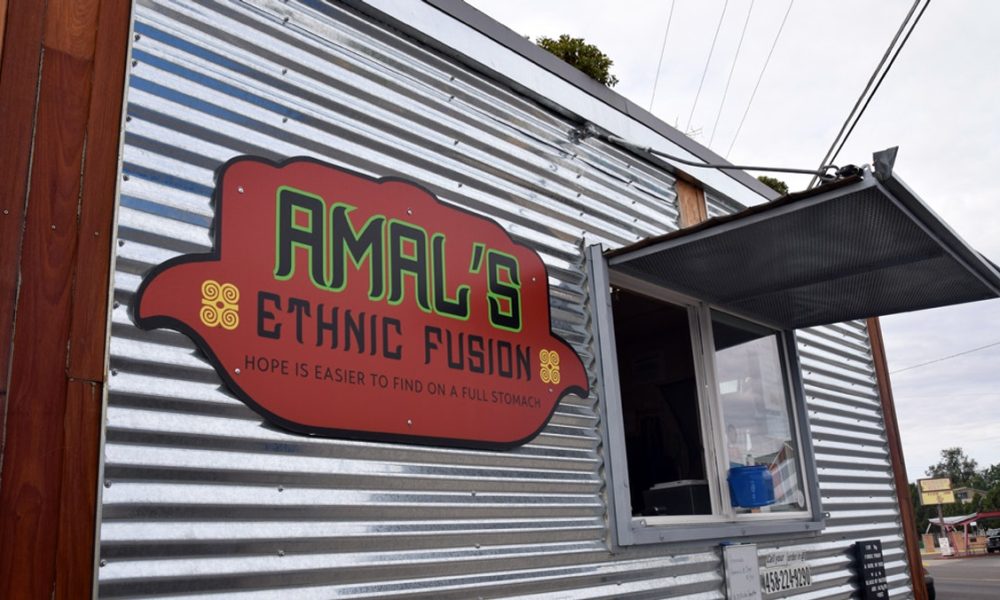 Amal’s Ethnic Fusion, a Middle Eastern-inspired food truck in the parking lot of the Four Rivers Health Clinic, is closing for the season and will reopen in the spring. Amal’s serves up middle Eastern classics such as falafel and shawarma cooked by refugees and new arrivals to Ontario from Iraq, Afghanistan, Somalia and other countries. (The Enterprise/Yadira Lopez)
Amal’s Ethnic Fusion, a Middle Eastern-inspired food truck in the parking lot of the Four Rivers Health Clinic, is closing for the season and will reopen in the spring. Amal’s serves up middle Eastern classics such as falafel and shawarma cooked by refugees and new arrivals to Ontario from Iraq, Afghanistan, Somalia and other countries. (The Enterprise/Yadira Lopez)
ONTARIO – If you’ve never tried Amal’s Ethnic Fusion food truck, this week is your last chance until next spring.
The Middle Eastern food truck run by refugees is closing for the season. Although they will still be available for catering, this year the truck will remain open from 11 a.m. to 6 p.m. until Friday, Sept. 27.
Since opening up in May in the parking lot of the Four Rivers Health Clinic, Amal’s has served up dishes inspired by flavors from Africa and the Middle East. The rotating cast of cooks come from Afghanistan, Iraq, Somalia and Syria among other countries.
Amal’s, which comes from the Arabic word for hope, started out as a way to give refugees in Ontario economic empowerment and a sense of place, said Renee Cummings, Four Rivers Welcome Center director.
“A lot of them had small businesses in their home countries or ran stalls at local markets,” Cummings said.
She had her eye on a food training program since running a soup kitchen at the Harvest House Missions in Ontario and noticing that the city is rife with job opportunities in the food industry.
[ Award-winning news coverage for $5 – SUBSCRIBE ]
 From left: Hawa Mohammed, Taha Almuthafar and Hamid Sedigi, from Somalia, Iraq and Afghanistan respectively, are relatively recent arrivals to Ontario. The trio works at Amal’s Ethnic Fusion food truck cooking up popular dishes from their countries. (The Enterprise/Yadira Lopez)
From left: Hawa Mohammed, Taha Almuthafar and Hamid Sedigi, from Somalia, Iraq and Afghanistan respectively, are relatively recent arrivals to Ontario. The trio works at Amal’s Ethnic Fusion food truck cooking up popular dishes from their countries. (The Enterprise/Yadira Lopez)
The food truck has been a stepping stone. For some employees, it was the first job they’d ever had. Cummings said they have trained 17 employees in recent months.
“People would come, get a month of experience under their belt and then get a better job. We have had people get employed really quickly,” Cummings said.
She decided to close for the season now that winter is coming. She and the staff will take the next few months to regroup and talk strategy for next year.
For now, regular customers will have to part with the jewelled rice sprinkled with raisins and almond slivers. And the mango lassi – a mango-yogurt drink – that comes dusted with cinnamon.
It’s been a two-way street, with locals getting introduced to new flavors.
“Most of the restaurants here are similar,” said Taha Almuthafar, an Iraq native who moved to the U.S. in 1992 and has been in Ontario since 2016. “Middle Eastern food is yummy food. It’s close to Turkish and Greek.”
Almuthafar is in charge of the falafel, one of the truck’s best sellers along with the chicken shawarma.
Every country has delicious dishes, he said, but Middle Eastern food is unique.
Maybe it’s the spices or the herbs, Almuthafar mused – just don’t ask what’s in his falafel.
“It’s a secret,” he joked last week as he scooped the parsley-speckled green mixture into the deep fryer.
Almuthafar, who also works as a translator at the Welcome Center, is especially proud when regular customers begin to notice his flavors.
“This is not Taha’s salad,” one customer recently said, balking.
On a recent Friday Almuthafar shared a shift with Hawa Mohammed, a mother of seven from Somalia, and chef Hamid Sedigi from Afghanistan. Sedigi’s native language is Dari, which no one else in the community speaks. But the trio manages, along with hand gestures and simple vocabulary.
Cummings recalls the learning curve when Sedigi started. In Afghanistan, cooks decide what’s on the menu for that day, which means every day is different. But American customers, Cummings explained to Sedigi, usually expect more consistency.
They compromised by building a menu of mainstays and offering daily specials, like the spicy chicken biryani that Sedigi whipped up last weekend – a chicken and rice combo that does not spare the spices.
It’s been a few months of success and error. Cummings guesses they’ve seen about 100 customers a week. Thinking long term, she hopes that some of her employees will open their own restaurants to showcase their countries’ cuisines.
Cummings said the Ford Family Foundation, one of the food truck’s funders, has shown interest in replicating the project in other communities with a growing refugee population.
“There are so many cool things that have come out of it,” she said.
News tip? Contact reporter Yadira Lopez: [email protected] or 541-473-3377.
For the latest news, follow the Enterprise on Facebook and Twitter.
SUBSCRIBE TO HELP PRODUCE VITAL REPORTING — For $5 a month, you get breaking news alerts, emailed newsletters and around-the-clock access to our stories. We depend on subscribers to pay for in-depth, accurate news produced by a professional and highly trained staff. Help us grow and get better with your subscription. Sign up HERE.




